It was inevitable. I had to make a choice on the Bible I would teach from at Hope Chapel Hill Country and what version I would recommend to our congregation.
After much thoughtful deliberation and prayer, I decided.
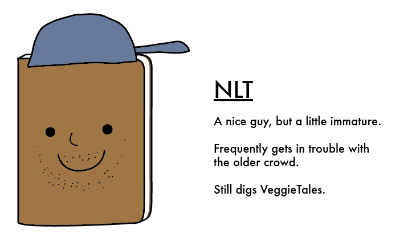 At my previous church, Hope Chapel Hermosa Beach, we had long discussions about what Bible to use after the publishers of the New International Version 1984 pulled it from the shelves, replacing it with a revamped and revised translation called the NIV 2011.
At my previous church, Hope Chapel Hermosa Beach, we had long discussions about what Bible to use after the publishers of the New International Version 1984 pulled it from the shelves, replacing it with a revamped and revised translation called the NIV 2011.
We analyzed many of the criticisms of this latest translation listening to John Piper and the Council on Biblical Manhood and Womanhood, and others. The conclusion at Hope Chapel Hermosa Beach was that we were going to use the English Standard Version. When I moved to Texas to plant Hope Chapel Hill Country, I had to decide what would be best for this culture.
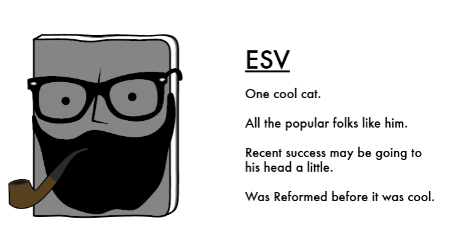 I read through the entire ESV after being an NIV ’84 guy for over twenty years, and didn’t like it. The reading, though an accurate translation, was just too wooden for me.
I read through the entire ESV after being an NIV ’84 guy for over twenty years, and didn’t like it. The reading, though an accurate translation, was just too wooden for me.
That’s why I chose a different version.
After careful deliberation and considering the sad state of literacy in our country, especially biblical literacy, I wanted the easiest version that people would read because I simply want people to read the Biblehe ESV is a 10th grade reading level; the NIV ’11 is 7-8th grade.)
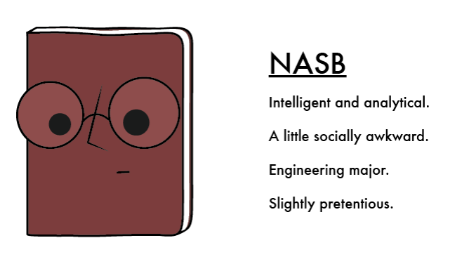 I read an in-depth review of the NIV ’11 from the Gospel Coalition that was very convincing (79 pages long, extensively foot-noted!). Rodney J. Decker,
I read an in-depth review of the NIV ’11 from the Gospel Coalition that was very convincing (79 pages long, extensively foot-noted!). Rodney J. Decker,
The NIV ’11 is now my Bible of choice at Hope Chapel Hill Country.
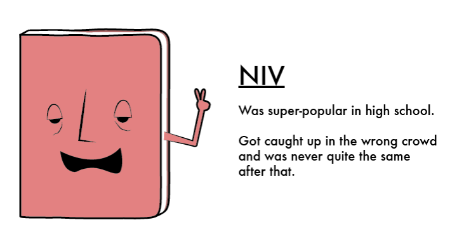 The controversies (and there are a few), can be dealt with as they come up while I preach God’s Word. (Professor Decker covers those issues in his analysis.)
The controversies (and there are a few), can be dealt with as they come up while I preach God’s Word. (Professor Decker covers those issues in his analysis.)
Dr. John MacArthur allowed his very popular MacArthur Study Bible to come out in the NIV ’11 translation. Here’s why:
“No matter what version of the Bible people are reading, I want to be able to help them understand the meaning fully and accurately. The NIV is the most widely used translation in the world, with millions of users. Some prefer it because they find it easier to read than other translations. All English versions of Scripture have translation problems and ambiguities. That’s one of the major benefits of a good study Bible. The notes and other tools built into the volume can highlight and clarify the proper meaning—or at least give a more precise understanding of what the original text actually says. My prayer is that these insights and explanations, together with the acclaimed readability of the translation, will help illuminate the true meaning and unleash the divine power of Scripture for NIV readers.” (From Pyromaniacs blog)
Perhaps you prefer the King James Version and think everyone should read that. Perhaps you’re a King James Only adherent. Here’s what apologist Greg Koukl said about that:
“I would steer you away from the King James Version only because the language is archaic, unless you went with the New King James Version. I recommend the King James Version for a very select group of people: people who are 350 years old or older!”
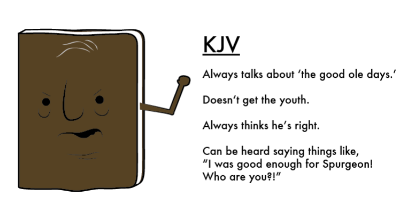 Personally, I still read from the NIV ’84 in my daily devotions, my wife, New King James Version, my 14-year-old, The New Living Translation, and our 12-year-old, believe it or not… the ESV.
Personally, I still read from the NIV ’84 in my daily devotions, my wife, New King James Version, my 14-year-old, The New Living Translation, and our 12-year-old, believe it or not… the ESV.
If it’s orthodox, whatever version of the Bible you read is a good version.
Just read it.
Randol
Scott deBeaubien
SlaveofChrist
Bizzle
Paul Latour
Steve Sanchez
Eric Stefan
Steve Sanchez